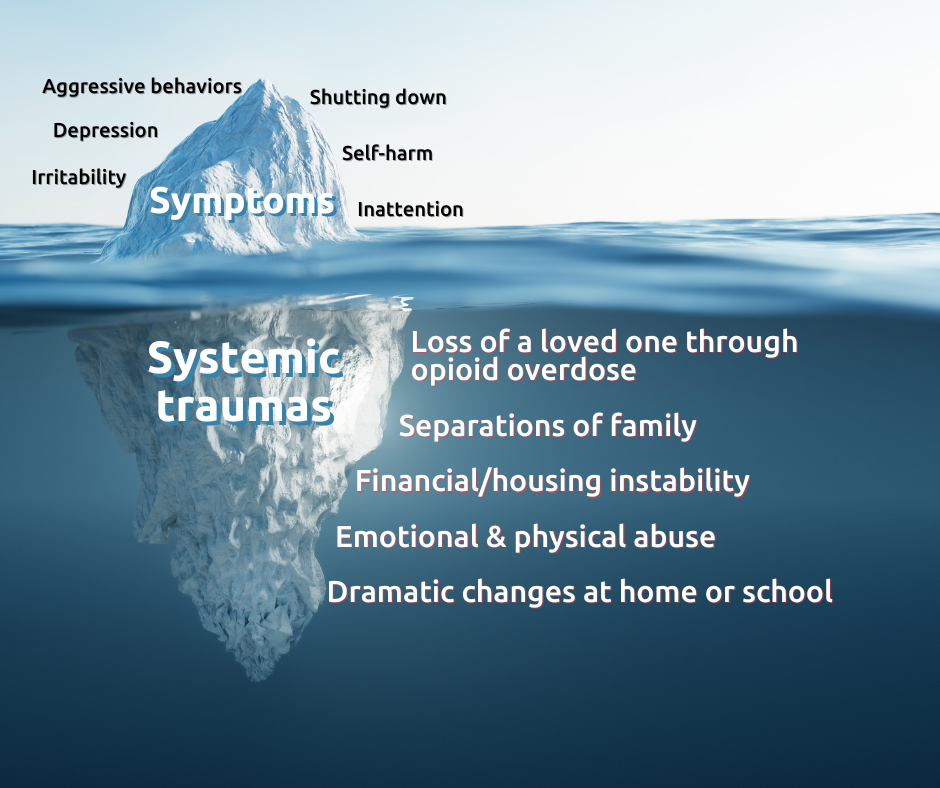Program Spotlight: Supporting Children-TST
Supporting Children - TST team (From left to right) Nicky Phelps, LPCC-S, Trauma Systems Therapist. Mendi Carrington, LPC, Trauma Systems Therapist. Nicky Miller, LPCC-S, Program Manager. Iris Goins, Family Engagement Specialist. Katie Rauch, LSW, Trauma Systems Therapist.
“So many times our children are just talked to and not talked with, and we are talking with them, listening to them and holding everyone else in their world accountable to helping them and I’m really proud of that.”
- Iris Goins, Supporting Children-Trauma Systems Therapy Family Engagement Specialist.
FrontLine Service takes the old adage “it takes a village to raise a child” literally, with many of our programs geared toward crisis and trauma support for children. FrontLine’s Supporting Children-Trauma Systems Therapy (TST) program takes a multi-faceted approach to process everything happening simultaneously to children in their homes and communities.
Darlene, 13, who lost her mother to an opioid overdose at a young age, recently relocated to her grandmother after witnessing her father’s opioid overdose. Though he survived, Cuyahoga County Division of Children and Family Services took custody from her father due to his opioid use. The young girl exhibits angry outbursts, argues with her grandmother, and steals from her purse. The Supporting Children team receives a referral for Darlene's case and reaches out, hoping to address her behaviors' true causes.
Supporting Children offers therapeutic assistance to children 5-17 processing the complex trauma of losing a caregiver to opioid overdose or exposure to substance use in Cuyahoga County. The program provides 6-12 months of a structured and immersive therapeutic approach to address the difficult behaviors and emotions they experience.
This first-of-its-kind program in Ohio utilizes Trauma Systems Therapy (TST), a revolutionary, evidence-based intervention approach developed by New York University Langone Health, led by Dr. Glenn Saxe. Supporting Children began in 2022, the first program in Ohio to adopt this practice. Dr. Glenn Saxe explains Trauma Systems Therapy recognizes and addresses various factors directly affecting children, such as grief, family mental health, violence, or financial and housing instability.
Traumatic experiences can lead to severe emotional and behavioral dysregulation in children, such as irritability, self-harm, shutting down, inattention, and withdrawal. Many children with trauma experience these episodes, resulting in fight, flight, or freeze responses, and are unable to manage their emotions and behaviors — even when the environment is relatively safe.
Supporting Children first identifies a potential family through referrals from county offices related to families affected by an opioid overdose, such as DCFS or the Medical Examiner’s Office. A family engagement specialist contacts the family to explain the program, offering to connect them to community resources and free, in-home, trauma-focused services. If they accept, the program specialist assesses the many issues affecting the child.
Concluding the assessment, a trauma systems therapist provides a treatment agreement letter to the family. The letter asks the child and the other adults who need to make and keep agreements about ways they can best support the child’s behavioral health.
This agreement goes beyond the home, reaching anywhere affecting the child’s mental and behavioral health, including school, court, and child welfare systems. The therapist continues to meet weekly with the family to determine the child’s behavioral improvement through the remainder of the treatment.
Darlene’s assessment identifies her home life, school life, and traumatic history of loved ones involved in opioid use as problem areas. The treatment agreement asks her grandmother, her father, her school’s administrators, and her DCFS agent to use different approaches to help her mental health.
Before long, Darlene’s behavioral and emotional health greatly improves, much like her school and home life. Unfortunately, Darlene’s father experiences another accidental opiate overdose, this time fatal. Darlene and her grandmother now have the foundational skills to help manage their emotions and behaviors, a team they know they can trust, and—most importantly—each other.


